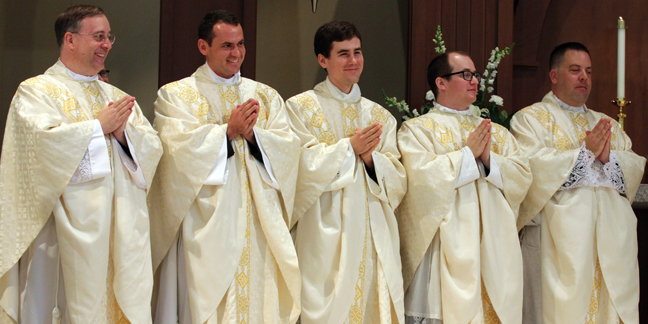 HUNTERSVILLE — The Diocese of Charlotte welcomed five new priests during a two-and-a-half hour ordination Mass celebrated by Bishop Peter Jugis June 17 at St. Mark Church. Hundreds of people were in attendance, including dozens of priests and deacons, women religious, members of the Order of Malta, the Knights of Columbus, Knights and Dames of the Holy Sepulchre and lay faithful.
HUNTERSVILLE — The Diocese of Charlotte welcomed five new priests during a two-and-a-half hour ordination Mass celebrated by Bishop Peter Jugis June 17 at St. Mark Church. Hundreds of people were in attendance, including dozens of priests and deacons, women religious, members of the Order of Malta, the Knights of Columbus, Knights and Dames of the Holy Sepulchre and lay faithful.
Seated before the sanctuary at the start of Mass, all five men were presented for ordination to the bishop by Father Christopher Gober, director of vocations for the diocese.
"Most Reverend Father, Holy Mother Church asks you to ordain these, our brothers, to the responsibility of the priesthood," Father Gober said. Upon Bishop Jugis' inquiry as to their worthiness, Father Gober affirmed it and Bishop Jugis accepted them for the order of the priesthood. Applause erupted from the faithful gathered for the celebration.
During his homily, Bishop Jugis said, “This is a great day of joy for all of us in the Diocese of Charlotte. Today we present these five deacons to Almighty God for ordination to the holy priesthood. They are now to be set apart by their ordination to participate as 'alter Christus' in Jesus’ priesthood for the work of salvation."
He explained that the men would receive the special anointing of the Holy Spirit which bestows the indelible spiritual character on them, configuring them to Christ the High Priest.
“Now, dear sons, in an act of deep faith and trust in almighty God, you make an offering of yourselves at this Mass,” he said. “Each of you makes a personal gift of himself to Almighty God. You hand yourselves over completely to Him for the work of salvation and you will teach the doctrine of 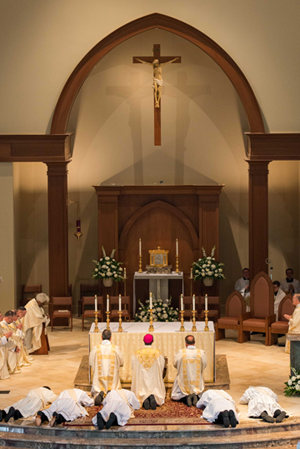 Christ, you will sanctify Christ’s people and you will shepherd them in collaboration with your bishop.
Christ, you will sanctify Christ’s people and you will shepherd them in collaboration with your bishop.
“Yes, you lay aside your personal plans and agendas … to become one with Christ. You are not your own. You are Christ’s. The priesthood is not about you, it is about Christ Jesus reconciling the world to the Father. It is about Christ’s work of salvation."
“What a profound blessing it is to have the freedom to make this gift of yourself!" he told them.
As they are being ordained during the diocese's Year of the Immaculate Heart of Mary, Bishop Jugis encouraged them to consecrate themselves to Mary.
"Mary shows us by her example how to be totally in the service of Jesus. She makes a gift of herself for the work of salvation. By consecrating yourself to her, you cannot go wrong,” he told them.
He reminded them that, “You now belong completely to Christ the High Priest, who receives you and now seals you and consecrates you with the grace of the Holy Spirit.”
After the homily, Bishop Jugis asked the men a series of questions to express their desire and willingness to be ordained priests and to fulfill the responsibilities that come with ordination. Then, one at a time, the men approached the bishop, placing their hands in his to signify obedience to him and to the Church.
The Litany of Supplication followed, during which the men lay prostrate before the altar as Bishop Jugis and everyone gathered at the Mass knelt in prayer and chanted the Litany of the Saints. Then they arose and approached the bishop, who laid his hands on their heads. During this most solemn moment of the ordination rite, Bishop Jugis prayed silently over them for the gift of the Holy Spirit to descend upon them.
Dozens of priests then took their turn laying hands on the newly ordained priests, joining the bishop in invoking the Holy Spirit to come upon the five men.
During the vesting portion of the ordination rite, Father Peter Ascik was vested by Father Carl Kaltreider. Father Matthew Bean was vested by Father Frederick Edlefsen. Father Brian Becker was vested by Monsignor John McSweeney. Father Christopher Bond was vested by Father Christopher Roux. Father Christian Cook was vested by Father Patrick Cahill.
During Communion each of the newly ordained priests was able to offer the Eucharist, which they consecrated along with Bishop Jugis and the other priests present, to their parents and families.
At the end of Mass, Bishop Jugis announced that Father Peter Ascik will be assigned to St. Thomas Aquinas Church in Charlotte, Father Matthew Bean will be assigned to St. Thomas Aquinas Church in Charlotte, and Father Brian Becker will be assigned to St. Mark Church in Huntersville, all effective July 11.
Father Christopher Bond will be assigned to St. Matthew Church in Charlotte, and Father Christian Cook will be assigned to Our Lady of Grace Church in Greensboro, both effective July 18.
A light reception after the ordination Mass was held in the Monsignor Kerin Family Life Center adjacent to the church.
Father Peter Ascik, a parishioner of St. Barnabas Church in Arden, studied at the Pontifical North American College in Rome. He is the son of Thomas and Karen Ascik.
Father Matthew Bean, a parishioner of St. Michael the Archangel Church in Gastonia, studied at the Pontifical College Josephinum. He is the son of Patrick and Megan Bean.
Father Brian Becker, a parishioner of St. Matthew Church in Charlotte, studied at the Pontifical College Josephinum. He is the son of Joseph and Tammy Becker.
Father Christopher Bond, a parishioner of St. Patrick Cathedral in Charlotte, studied at the Pontifical College Josephinum. He is the son of Allen and Virginia Bond.
Father Christian Cook, a parishioner of St. Eugene Church in Asheville, studied at the Pontifical College Josephinum. He is the son of William and (the late) Ursula Cook.
— SueAnn Howell, senior reporter
Photo and video galleries
New priests’ first Masses scheduled
CHARLOTTE — The Diocese of Charlotte’s newest priests will offer their first Masses as follows:
- Father Peter Ascik: 2:30 p.m. Sunday, June 18, at St. Lawrence Basilica in Asheville, with homilist Father Adrian Porras
- Father Matthew Bean: 10 a.m. Sunday, June 18, at St. Michael the Archangel Church in Gastonia, with homilist Father Frederick Edlefsen
- Father Brian Becker: 12:30 p.m. Sunday, June 18, at St. Matthew Church in Charlotte, with homilist: Father John Eckert
- Father Chris Bond: 12:30 p.m. Sunday, June 18, at St. Patrick Cathedral in Charlotte, with homilist Dominican Father W. Becket Soule
- Father W. Christian Cook: 4:30 p.m. Saturday, June 17, St. Ann Church, Charlotte. Homilist: Father W. Becket Soule, O.P. In addition, he will offer a Mass of Thanksgiving at his home parish, St. Eugene Church, Asheville, at 11 a.m. Sunday, June 25.
All are welcome to attend.
Biographies: Meet the men ordained for the Diocese of Charlotte
-
Biographies: Meet the men ordained for the Diocese of Charlotte
Father Peter Ascik

Home parish: St. Barnabas Church, Arden
Birthplace: Fairfax, Va.
Birthday: Aug. 29, 1986
Raised in: Asheville
Family: Parents Thomas and Karen Ascik; siblings Mary Katherine, Elizabeth, Daniel, Gregory, John, Christine, Julie and Emily
College: Appalachian State University; University of Georgia
Degree: B.S. in chemistry and B.A. in English from Appalachian State University; M.S. in chemistry from the University of Georgia
Pre-Theology: Pontifical College Josephinum, Columbus, Ohio
Theology: Pontifical North American College, Rome
Summer assignments in the diocese: St. John the Baptist Church, Tryon; St. Ann Church, Charlotte; St. Eugene Church, AshevilleCNH: What are some of your interests/hobbies?
Ascik: I enjoy reading, especially literature, philosophy and the sciences. I enjoy music and movies.CNH: When did you first realize you had a vocation to the priesthood?
Ascik: I began to have serious thoughts about it in high school.CNH: Who has helped you or given you a good example to follow during these years of discernment and seminary?
Ascik: I have learned a lot from the pastors I spent time with during the summers, Father John Eckert, Father Timothy Reid and Deacon Tom Sanctis, Father Pat Cahill and Deacon Mike Zboyovski. I also learned a lot from spending time at my home parish with Father Adrian Porras and our two deacons, Mike Stout and Rudy Triana.CNH: What are you looking forward to most in your priestly ministry?
Ascik: Preaching the Gospel, celebrating the sacraments, especially the Eucharist and confession, and helping people to know that God has come very near to us.CNH: What would you like to say to young men who may have a call to the priesthood?
Ascik: There is no greater freedom to be had than in following Christ. His will is our only truly lasting possession. There is an answer to the question your heart is asking. Seek and you will find.CNH: Is there any comment you would like to share with our readers about becoming a priest here in the Diocese of Charlotte?
Ascik: Everyone in our diocese, from the bishop to the presbyterate to parishioners, has been very supportive of me during my time as a seminarian. This gives me a lot of confidence in following my vocation to be a priest in the Diocese of Charlotte.Father Matthew Bean
 Home parish: St. Michael the Archangel Church, Gastonia
Home parish: St. Michael the Archangel Church, Gastonia
Birthplace: Buffalo, N.Y.
Birthday: Jan. 16, 1987
Raised in: Buffalo, N.Y.
Family: Parents Patrick and Megan Bean; brother Timothy
Degree: B.A. in history, University of Mary Washington
Pre-Theology: St. Charles Borromeo Seminary, Philadelphia
Theology: Pontifical College Josephinum
Summer assignments in the diocese: St. Mark Church, Huntersville; St. Patrick Cathedral, CharlotteCNH: What are some of your interests/hobbies?
Bean: In my free time I like to read books in the area of history, especially the Civil War and the Roman Empire. I also like to exercise, and watch movies with my brothers here at the seminary. I also like to keep up with ice hockey, which I grew up with in western New York.CNH: When did you first realize you had a vocation to the priesthood?
Bean: I started to seriously discern the priesthood when I was in college at the University of Mary Washington in Fredericksburg, Va. When in college I was involved at the campus ministry, and it was through time spent in prayer and the encouragement of the chaplain at the campus ministry that I began to ask the Lord if He was calling me to be a priest.CNH: Who has helped you or given you a good example to follow during these years of discernment and seminary?
Bean: There have been a number of people who have been a great help and example to me in the past five years in formation at the seminary. Many priests, such as Father Frederick Edlefsen (the chaplain at the campus ministry I was involved in at college); Father John Putnam, and Father Matthew Buettner have shown me what it is to be a priest and to bring Christ to those you are called to serve. My family and the people of the diocese have also been very supportive in their prayers and encouragement.CNH: What are you looking forward to most in your priestly ministry?
Bean: I am looking forward to serving the people in the diocese and bringing Christ to those the Lord entrusts to my care.CNH: What would you like to say to young men who may have a call to the priesthood?
Bean: I would encourage them to stay close to the Lord in prayer, and if he feels the Lord is prompting him to go to seminary, to go and further discern the call. Above all things, find a good spiritual director who can assist you in discerning the voice of the Lord, which at times can be very subtle.CNH: Is there any comment you would like to share with our readers about becoming a priest here in the Diocese of Charlotte?
Bean: I am very grateful for the support the people of the diocese have given not only me, but also the other men we currently have in formation. I look forward to serving the people of the diocese in my priestly ministry.Father Brian Becker
 Home parish: St. Matthew Church, Charlotte
Home parish: St. Matthew Church, Charlotte
Birthplace: Charlotte
Birthday: Jan. 30, 1986
Raised in: Charlotte
Family: Parents Joseph and Tammy Becker; siblings Deena and Mark
Degree: Economics, international studies at the University of North Carolina-Charlotte
Pre-Theology: Pontifical College Josephinum
Theology: Pontifical College Josephinum
Summer assignments in the diocese: St. Eugene Church, Asheville; St. John the Baptist Church, Tryon; St. Thomas Aquinas Church,Charlotte; Costa Rica Spanish Immersion; St. Mark Church, HuntersvilleCNH: What are some of your interests/hobbies?
Becker: I grew up playing sports, baseball, basketball and cross country in high school, and played club Ultimate Frisbee at UNC. I’ve really enjoyed getting to play sports in seminary also. We old guys get to chase the collegians around the football field in our Mudbowl each fall, and the Josephinum hosts an interseminary basketball tournament each winter which we finally won this year!CNH: When did you first realize you had a vocation to the priesthood?
Becker: I first felt a strong call to discern the priesthood when I was 24, and entered seminary a year later. This first pull was very strong, and God’s grace cleared the way for me to enter seminary easily. But I didn’t feel confident that I had a vocation to the priesthood until a couple of years into seminary.CNH: Who has helped you or given you a good example to follow during these years of discernment and seminary?
Becker: We have a lot of very good priests at the seminary who have helped me greatly, but my most helpful experiences have come from my relationships with my pastors in each of my summer assignments. Father Pat Cahill, Father John Eckert, Father Patrick Winslow and Father John Putnam each very generously provided a great example of how to live one’s priesthood – at the altar, in the parish, in the rectory, and in each area of their lives. Being able to live alongside these priests in close proximity has been the most powerful example that I have been given to follow. Monsignor John McSweeney has also been very generous and helpful to me throughout my discernment and seminary formation.CNH: What are you looking forward to most in your priestly ministry?
Becker: The sacrament of reconciliation has given me so many tangible experiences of God’s grace. It has been a source of transformation as God has forgiven me my sins and given me grace to overcome them, and one of my great desires is to be able to share this with God’s people as a priest. The celebration of the Holy Sacrifice of the Mass is the center of the life of the priest, and I look forward to being able to celebrate this greatest of the sacraments for the people of the diocese.CNH: What would you like to say to young men who may have a call to the priesthood?
Becker: Pope St. John Paul II constantly told all those discerning a vocation to priesthood or religious life, “Be not afraid.” If you feel He is calling you to discern a vocation to the priesthood, trust in God. If it is His will that you be a priest, then He will clear the way before you. Stay close to Him in prayer so that you can listen, and follow the path that He will make clear to you.CNH: Is there any comment you would like to share with our readers about becoming a priest here in the Diocese of Charlotte?
Becker: I would like to say thank you to all the people of the diocese who have so generously aided me and my brothers on this path of discernment and formation for the priesthood. The support you have offered us in your material contributions and especially in your prayers has been so beneficial to us, and it has borne great fruit for the diocese. Please continue to pray for us and for more vocations for the diocese – both priests and religious.Father Christopher Bond
 Home parish: St. Patrick Cathedral, Charlotte
Home parish: St. Patrick Cathedral, Charlotte
Birthplace: Stroudsburg, Pa.
Birthday: June 12, 1975
Raised in: Stroudsburg, Pa.
Family: Parents Allen and Virginia Bond; siblings, Debbie and Beth
Degree: B.A. in business administration, University of North Carolina-Charlotte
Pre-Theology: Pontifical College Josephinum
Theology: Pontifical College Josephinum
Summer assignments in the diocese: St. Ann Church, Charlotte; St. Michael the Archangel Church, Gastonia; St. Thomas Aquinas Church, CharlotteCNH: What are some of your interests/hobbies?
Bond: I enjoy cooking, bike riding, basketball, creative writing, fishing and going to the beach.CNH: When did you first realize you had a vocation to the priesthood?
Bond: I was 30 years old before I seriously even considered becoming a priest. It took another few years before I was able to discern, through much prayer, that God was indeed calling me to such a vocation.CNH: Who has helped you or given you a good example to follow during these years of discernment and seminary?
Bond: This is a difficult question to answer exhaustively because the Diocese of Charlotte is blessed with so many sincere, holy and “normal” priests. It is their collective dedication to beautiful liturgy and their insatiable desire to do the will of God which I hope to emulate the most.CNH: What are you looking forward to most in your priestly ministry?
Bond: Offering the Holy Sacrifice of the Mass is, without a doubt, what I look forward to the most. In a very, very close second, I am truly looking forward to extending God’s mercy to poor sinners – the very same unfathomable mercy He has granted to me.CNH: What would you like to say to young men who may have a call to the priesthood?
Bond: This may sound like a cliché, but, “Follow your heart!” I would also tell them that God does not ask of us what we cannot do. He gives us the strength to do what He particularly wills for each one of us in our own lives. If He wants you to be a priest, He will provide for that. Thoughts of inadequacy, incompetency, and certainly unworthiness will naturally arise. The devil often uses these thoughts to drive a wedge between us and our true vocation (between us and Our Savior). However, these thoughts are present to keep us ever mindful that we are not the Savior of the world. But a priest brings the Savior to the world.CNH: Is there any comment you would like to share with our readers about becoming a priest here in the Diocese of Charlotte?
Bond: This is mere speculation, but I wonder if I would have ever properly discerned the vocation to the priesthood if I had never moved to Charlotte. The brotherhood among priests in this diocese (which I have already started to enjoy) is much rarer than people realize. Having gotten to know priests and future priests of many other dioceses across the country, it appears that the fraternity among priests, deacons and seminarians in the Diocese of Charlotte is unique. Furthermore, I believe it is both a cause and effect of our flourishing diocese!Father Christian Cook
 Home parish: St. Eugene Church, Asheville
Home parish: St. Eugene Church, Asheville
Birthplace: High Point
Birthday: Aug. 15
Raised in: High Point and Asheville
Family: Parents William and (the late) Ursula Cook; siblings, Liesel and David
Degree: B.S. in business administration and Master of Public Affairs, Western Carolina University; Juris Doctor, The University of Dayton School of Law
Pre-Theology: St. Charles Borromeo Seminary
Theology: Pontifical College Josephinum
Summer assignments in the diocese: St. Eugene Church, Asheville; St. Ann Church, Charlotte; St. John Neumann Church, CharlotteCNH: What are some of your interests/hobbies?
Cook: I enjoy reading, playing basketball and soccer, watching/attending sporting events, sailing and boating, skiing (water and snow), hiking in the mountains and cooking.CNH: When did you first realize you had a vocation to the priesthood?
Cook: When I was a young altar boy at St. Eugene, I served for many good priests such as Monsignor Joseph Showfety, Father Carl Del Giudice, Father Richard Hansen and Father James Solari. I was attracted to the idea of the priesthood then, and the seed of a vocation was planted back in grade school. However, it was not until I was practicing law in corporate America that the idea of a vocation to the priesthood returned. As I discerned further, the Lord made it very clear to me that I should discern a call to the priesthood in the seminary. My entire family has been so supportive; my vocation has been sustained by their love, prayers and encouragement.CNH: Who has helped you or given you a good example to follow during these years of discernment and seminary?
Cook: The priests of the Diocese of Charlotte have been such great mentors to me through the years of seminary, and I have leaned on the spiritual fatherhood of Bishop Peter Jugis throughout my discernment and preparation in the seminary. Our vocations director, Father Christopher Gober, has been a great steward of my formation. I have tried to learn something from every priest in the diocese and many have been great examples and mentors to me, especially the priests to whom I was assigned during the summers: Father Pat Cahill, Father Timothy Reid and Father Pat Hoare.CNH: What are you looking forward to most in your priestly ministry?
Cook: I am looking forward to serving the faithful of the Diocese of Charlotte, most especially by offering the Holy Sacrifice of the Mass, and in the sacrament of penance. I have been supported by the faithful of the diocese for six years during my education and formation to the holy priesthood, so I most especially look forward to now serving them with my entire life.CNH: What would you like to say to young men who may have a call to the priesthood?
Cook: If there is even a slight interest in the priesthood, a man should fully submit to that stirring in prayer. Go to daily Mass, if possible, and spend time in front of the Blessed Sacrament. Speak with your pastor and the vocations director. It is important to remember that, just because you speak with a priest about the priesthood, it does not mean you will pressured to go to the seminary. Do not be scared away from talking with a priest about a possible vocation to the priesthood – there is no pressure. But to properly discern whether you are being called or not, you must pray and be open to discussions with a priest. Otherwise, you may miss God’s call to you.CNH: Is there any comment you would like to share with our readers about becoming a priest here in the Diocese of Charlotte?
Cook: I want to thank everyone in the Diocese of Charlotte for their prayers during my seminary formation. The amount of support I received was a beautiful witness to their faith! I look forward to serving the people of the diocese, and let us continue to pray for one another daily.— Catholic News Herald
Parents of new priests share their reflections
-
Parents of new priests share their reflections
HUNTERSVILLE — Five families heralded in a new chapter in their lives as their sons received the sacrament of holy orders June 17. Prayers, hopes and dreams came to fulfillment as Father Peter Ascik, Father Matthew Bean, Father Brian Becker, Father Christopher Bond and Father Christian Cook were ordained priests at St. Mark Church.
THOMAS AND KAREN ASCIK
We found out about Peter’s vocation when he called us up and told us that he was applying to the seminary! He was in a doctoral program at the University of Georgia, studying computational quantum chemistry. We were surprised, yet not surprised. I think we had a sense that Peter was searching for something.
Once Peter applied, everything seemed to fall into place in a providential way, and he was accepted. He received his acceptance on the feast of St. John Vianney, patron of parish priests. This seemed to me another sign that this was something that God had initiated.
When Peter had his candidacy ceremony, I remember telling Bishop Peter Jugis that Peter belonged to him now. God made this clear when Peter was sent to study in Rome – contrary to what I had wished! Yet I kept seeing God’s hand and providence in all Peter’s seminary studies, experiences and opportunities.
What does Peter’s vocation mean to our family? As parents, we feel incredibly blessed that God has called our eldest son and that he has answered that call. Peter’s response to God fills us with joy. We pray that his vocation will bless his siblings, nieces and nephews, and all our extended family.
From the first day nearly six years ago that Peter told us that he was applying to the seminary, up to now, I have prayed from 1 Samuel 2:35 that in Peter God would “raise up for (Himself) a faithful priest” who would do “what is in (His) heart and mind.” We are filled with gratitude for all God has done and will do in Peter’s life, and how He has prepared Peter to serve His people as a priest.
As my wife Karen said, Peter had the beginning of a good academic career going for himself but gave it up for what he calls “a greater Love.” We have become acquainted somewhat with the four other men being ordained with Peter, and they all have similar stories and have made similar choices. Despite personal success, they all felt something was not right. There was something still out there, something to be done. More pertinently, there was Someone out there.
PATRICK AND MEGAN BEAN
I first realized Matthew had a vocation to the priesthood when he was 10 years old. I never said anything to him; I wanted Matthew to come to me. He would talk to me over the years and I would just listen. It was his sophomore year of college that he asked if he could talk to me about something. He told me that he planned on entering the seminary once he finished his four years of college. He felt called to be a priest. I remember that day like it was yesterday. I hugged him and told him that I loved him.
I feel blessed to have a son answer God’s call and dedicate his life to serve God and the Church. I feel tremendous joy to be able to witness Matthew’s discernment over the years.
I can’t believe how quickly the past six years of seminary have gone by. (I’m not sure how the men feel about that!) When people asked when he would be ordained a priest, I would reply,”One year dow, five to go... Two down, four to go ... Three down, three to go, etc. Just like that, six years have passed!”
JOSEPH AND TAMMY BECKER
We became aware of Brian’s desire for discernment in the late summer of 2010 when he approached us to say he felt called to the priesthood and was taking some dedicated time to discern. Prior to that there were some key events that, in retrospect, were meaningful. Tammy had an experience when she felt called to pray about the possibility of him being a priest. Brian was in middle school at Holy Trinity, and Tammy was there for a Mother’s Mass on the feast of St. Monica. She realized that in her prayers for Brian’s future, she was not seriously addressing a vocation to the priesthood as a path for him. Another significant time was when Brian felt led by the Lord to accompany Joe on a mission trip to Jamaica. While there, he had a key experience with a wonderful priest from our diocese. Finally, when he quit his job near the beginning of 2010 and was seeking a new direction in his life, we prayed fervently that the Lord would clearly reveal Brian’s vocation to him.
Part of our understanding of stewardship is that everything in our lives is given to us for God’s purpose, including our children. We have always prayed that they would grow in their understanding of how much Jesus loves them, in their love of the Lord and in their willingness to serve Him as they are called. All of our children have answered the Lord’s call to serve in different ways. However, Brian’s willingness to serve the Lord as His priest has strengthened our own faith, deepened our prayer lives and challenged us to serve Him more completely. As parents we know that in answering God’s call to the priesthood, Brian will find meaning, purpose and joy in his life.
We are so excited about Brian’s ordination. He has a beautiful, prayerful relationship with Jesus, a deep understanding and love of the Catholic Church and is eager to know and serve the people of this diocese as their priest. We are grateful for all those who have prayed for Brian and supported his discernment and formation over these many years.
ALLEN AND VIRGINIA BOND
The year Chris turned 15, our family made a pilgrimage to Medjugorje. It was at this beautiful Marian shrine that we began to recognize a possible priestly vocation in our son. His father and I soon came to realize that this inspiration came with both a request and a mission – to pray for the vocation of our son. And so we began – for the next 25 years we prayed. Our prayer was never, “Lord, make our son a priest,” but rather, “Lord, protect our son’s vocation and open his heart to Your will.” We did not pray alone for this intention. Our daughters Debbie and Beth joined us. Over the years we enlisted the prayers of extended family, friends, priests and cloistered nuns – anyone who would listen and agree to pray. The novenas and rosaries we have prayed must number in the thousands. Our Heavenly Father heard our prayers. About seven years ago, we began to see signs of God’s grace at work in Chris. A pilgrimage to Fatima and a Cursillo weekend put Chris on a journey that led him to a life of prayer, daily Mass and a process of discernment.
On Dec. 10, 2010, Chris announced to the family that, God willing, he would enter the seminary that fall to study for the priesthood. You cannot imagine the joy in that room that night! The tears and hugs just went on and on – Chris’ 16 nieces and nephews were jumping up and down and shouting with joy.
God gave our family a great grace in knowing Chris’ vocation, but there were also great blessings in Our Lord’s timing in answering our prayers. Those 25 years of storming heaven have taught us so much. God has given us a beautiful understanding of His faithfulness, and He helped us to grow in trust, patience and perseverance. God has given our family a great love of the priesthood, and we pray daily for our bishops, priests and seminarians. We will be eternally grateful for this great grace God has given Chris and our family.
WILLIAM COOK
Being an altar boy at a very young age, Christian developed an early interest in the priesthood. He discussed it with his mother Ursula and myself on occasion. After going away to school and starting his career, I realized the interest was still present when he began attending discernment retreats. I realized the call to a priestly vocation was still present.
Our entire family is very humbled, gratified and blessed that Christian has been chosen and answered the call to the priesthood. We, too, are very excited and thankful for all of our newly ordained diocesan priests on this special day.
There are many in the diocese to whom we are very thankful and appreciative of their continued prayers and support. However, there are two very special people who have been the most positive role models and sources of inspiration during this journey: his mother and his grandfather William Schneider.
— SueAnn Howell, Senior reporter
The ordination rite explained
-
The ordination rite explained
Editor’s note: Never attended an ordination before? Here is a helpful guide to the ordination Mass, which will be celebrated starting at 9:30 a.m. Saturday, June 17, at St. Mark Church in Huntersville:
What is the sacrament of holy orders?
Holy orders is the sacrament of “apostolic ministry” – that is, how “the mission entrusted by Christ to His Apostles continues to be exercised in the Church until the end of time. …” (CCC 1536)
The word “ordination” derives from the word “order,” which is the “appropriate disposition of things equal and unequal, by giving each its proper place” (St. Augustine, “City of God,” XIX.13). Order is used to signify not only the particular rank or general status of the clergy, but also the sacramental act by which they are raised to that status: ordination.
Ordination to the priesthood takes place within the context of the Mass. The rite, most of which dates back many centuries, has several distinct parts, but the essential element is the laying on of hands on the head of the ordinand and the bishop’s consecratory prayer
The rite of ordination
- Calling of the Candidates: In the ordination rite, after the opening prayers of the Mass and the scripture readings, the presentation of the candidate takes place. The candidate responds, “Present,” (in Latin, “Adsum”) steps forward and makes a sign of reverence.
- Presentation, Inquiry and Acceptance: Bishop Jugis then asks for testimony that the candidate has received proper training and is worthy of ordination. Father Christopher Gober, diocesan vocation director, attests that the candidate is prepared. The bishop then says: “Relying on the help of the Lord God and our Savior Jesus Christ, we choose this man, our brother, for the Order of the Priesthood.” The people respond “Thanks be to God,” and also give their approval by a hearty round of applause.
- Examination of the Candidate: After the homily, the candidate approaches Bishop Jugis, who asks him if he is willing to serve Christ and His Church as a faithful priest. The examination concludes with this exchange: Bishop Jugis, “Do you resolve to be united more closely every day to Christ the High Priest, who offered Himself for us to the Father as a perfect sacrifice, and with Him to consecrate yourself to God for the salvation of all?” Candidate, “I do, with the help of God.”
- Promise of Obedience: The candidate then promises obedience to the authority of the Church and to his own religious superiors, as he kneels before Bishop Jugis. Why? The bishop is the head of the local Church. St. Ignatius of Antioch said the bishop is “typos tou Patros” – he is like the living image of God the Father. (CCC 1549) “The promise of obedience they make to the bishop at the moment of ordination and the kiss of peace from him at the end of the ordination liturgy mean that the bishop considers them his co-workers, his sons, his brothers and his friends, and that they in return owe him love and obedience.” (CCC 1567)
- Prayer for the Candidates: Bishop Jugis kneels and invites all of those present to join in prayer for the candidate. This period of prayer includes the Litany of the Saints. The chanting of the Litany of the Saints is an especially moving and memorable moment in the ordination ritual. The candidate prostrates himself before the altar as the prayers of the Litany invoke God’s saving mercy and the intercession of all the saints to send down the Holy Spirit upon this man, soon to be a priest.
The Litany of the Saints is an ancient prayer. The Catholic Encyclopedia says, “It was used in the ‘Litania Septiformis’ of St. Gregory the Great, and in the procession of St. Mamertus. In the Eastern Church, litanies with the invocation of saints were employed in the days of St. Basil (d. 379) and of St. Gregory Thaumaturgus (d. about 270). It is not known when or by whom the litany was composed, but the order in which the Apostles are given, corresponding with that of the Canon of the Mass, proves its antiquity.”
- Imposition of hands: This is an outward sign of the outpouring of the Holy Spirit. Just as Jesus conferred His priesthood on His Apostles, so too does the bishop and other priests lay hands upon the ordinand. It is the most ancient and universal outward ritual of the Church. “The laying on of hands by the bishop, with the consecratory prayer, constitutes the visible sign” of ordination. (CCC 1538) In this moment, as Bishop Jugis lays his hands upon the head of the kneeling ordinand, he prays silently for the invocation of the Holy Spirit.
All the other priests who are present also join in the ordination ceremony. Each one in turn lays his hands silently upon the head of the candidate. This signifies that they all belong to, and participate in, the one priesthood of Jesus Christ. It is also a sign welcoming the newly ordained into the common brotherhood as priests.
- Prayer of Consecration: Bishop Jugis prays: “Grant, we pray, Almighty Father, to this, your servant, the dignity of the priesthood; renew deep within him the Spirit of holiness; may he henceforth possess this office which comes from You, O God, and is next in rank to the office of Bishop; and by the example of his manner of life, may he instill right conduct. May he be a worthy coworker with our Order, so that by his preaching and through the grace of the Holy Spirit the words of the Gospel may bear fruit in human hearts and reach even to the ends of the earth.”
- Vesting the New Priest: The newly-ordained priest now removes his deacon’s stole and is presented with the symbols of his new office in the Church: a priestly stole and chasuble. This is called the investiture.
- Anointing of the Hands: Bishop Jugis anoints the palms of the new priest with sacred chrism, praying, “The Lord Jesus Christ, whom the Father anointed with the Holy Spirit and power, guard and preserve you that you may sanctify the Christian people and offer sacrifice to God.” After the anointing with the oil, the priest’s hands are wrapped with a linen cloth. Anointing with sacred oil, or chrism, symbolizes the Holy Spirit. It is another ancient ritual that has Old Testament roots.
- Presentation of the Gifts: After the gifts of bread and wine are brought to the altar, Bishop Jugis gives to the new priest a chalice containing the wine, mixed with water, and the paten holding the bread. These are the sacred vessels used at each Mass to hold the Body and Blood of Christ in the Eucharist. As the priest receives the chalice and the paten, Bishop Jugis says: “Receive the oblation of the holy people, to be offered to God. Understand what you do, imitate what you celebrate, and conform your life to the mystery of the Lord’s cross.”
- Kiss of Peace: Lastly, Bishop Jugis gives the kiss of peace to the new priest, saying: “Peace be with you.”
The Mass continues as usual, with the new priests concelebrating fully in their first Eucharistic sacrifice, standing closest to Bishop Jugis in a place of honor before the altar. The new priests also help distribute Holy Communion.Why does the Church ordain priests?
The rite of ordination is more than an “election” or “delegation” of someone as a priest. The sacrament “confers a gift of the Holy Spirit that permits the exercise of a ‘sacred power’ which can come only from Christ Himself through His Church.” (CCC 1538) The divine grace received through this rite sets these men apart – consecrates them, invests them – within the Church and gives them a unique mission among the People of God.Why are only men ordained priests?
Jesus chose 12 men as His Apostles, conferring upon them the mission to serve in His place on earth, and the Apostles did the same when they chose others to join and to succeed them. The Church is bound by the choice that Jesus Himself made, so it’s not possible for women to be ordained. Though in earlier times there were several semi-clerical ranks of women in the Church (called deaconesses), they were not admitted to orders properly so called and had no spiritual authority. They served women in particular, in instances where customs called for men and women to remain separate.
An indelible mark
Holy orders is one of three sacraments that have an indelible spiritual character – that is, they cannot be repeated or rescinded. The others are baptism and confirmation. From the moment of his ordination, a priest’s vocation and mission mark him permanently. (CCC 1583)
Like the sacrament of marriage, in which men and women give themselves totally to each other and grow in holiness together, holy orders is directed toward the salvation of others through the gift of oneself. “They confer a particular mission in the Church and serve to build up the People of God. … Those who receive the sacrament of holy orders are consecrated in Christ’s name ‘to feed the Church by the word and grace of God.’” (CCC 1534-1535)
A priest acts “in persona Christi” – that is, he acts with the authority of Christ, representing the person of Christ in administering the sacraments and shepherding the faithful – and “in nomine ecclesiae,” in the name of the Church. That doesn’t mean a priest is perfect! That just means that in administering the sacraments, the power of the Holy Spirit is assured.
‘The voice and hands of Christ’
In his 1990 address “On the Nature of the Priesthood,” then Cardinal Joseph Ratzinger (now Pope Emeritus Benedict XVI) said: “Jesus gave His power to the Apostles in such a way that He made their ministry, as it were, a continuation of His own mission. ‘He who receives you receives me,’ He Himself says to the Twelve (Mt 10:40; cf. Lk 10:16; Jn 13:10).”
He added, “If Church usage calls ordination to the ministry of priesthood a ‘sacrament,’ the following is meant: This man is in no way performing functions for which he is highly qualified by his own natural ability nor is he doing the things that please him most and that are most profitable. On the contrary, the one who receives the sacrament is sent to give what he cannot give of his own strength; he is sent to act in the person of another, to be his living instrument. For this reason no human being can declare himself a priest; for this reason, too, no community can promote a person to this ministry by its own decree. Only from the sacrament, which belongs to God, can priesthood be received. Mission can only be received from the One who sends, from Christ in His sacrament, through which a person becomes the voice and the hands of Christ in the world.”
— Patricia L. Guilfoyle, editor



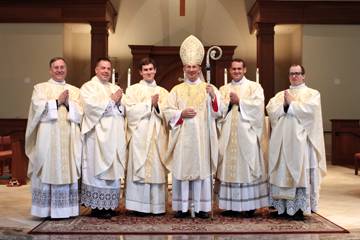
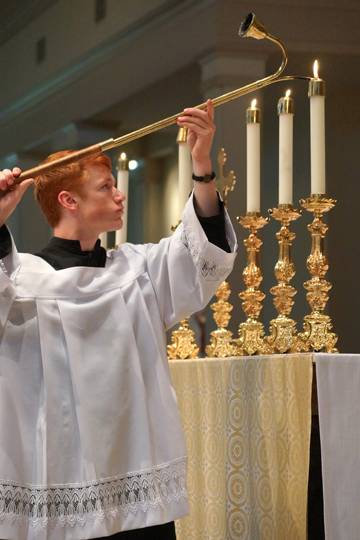
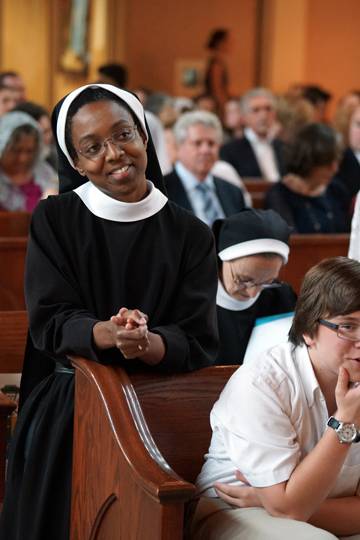
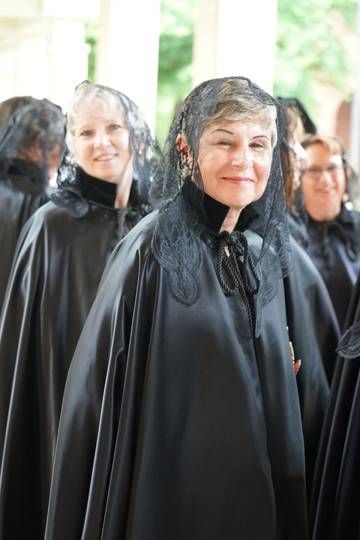
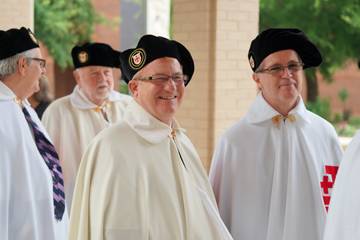
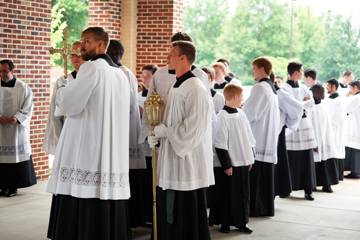
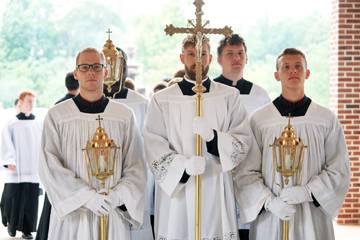
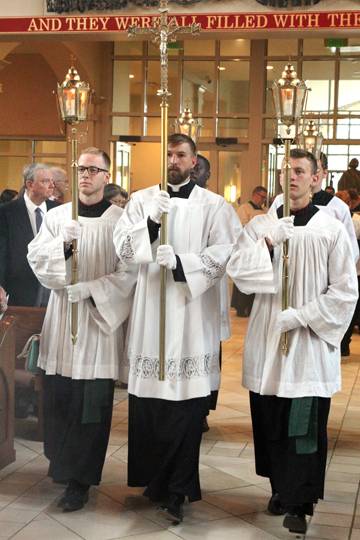
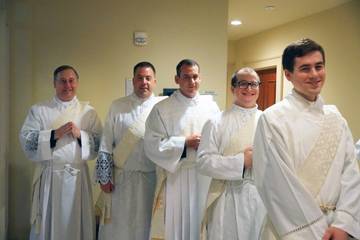
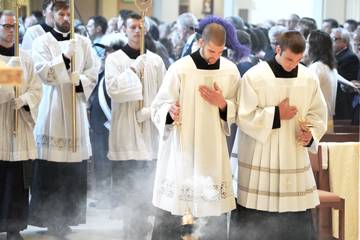
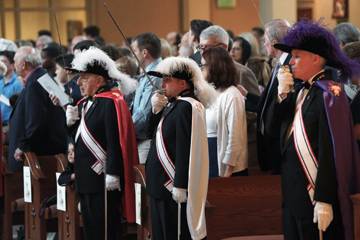
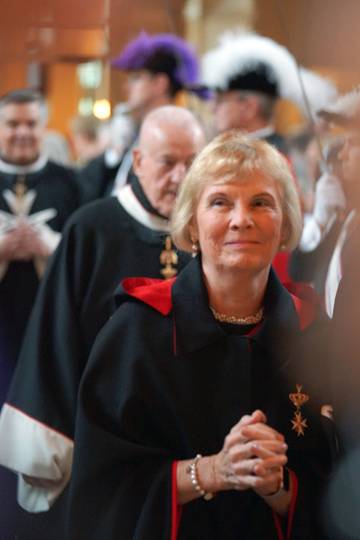
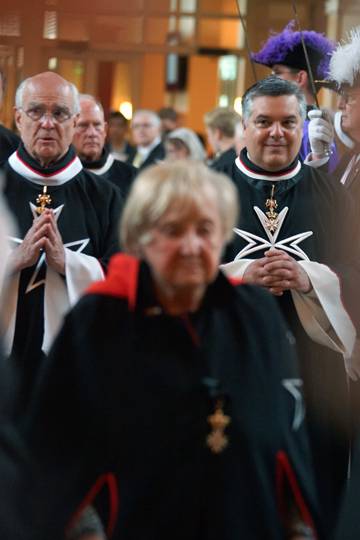
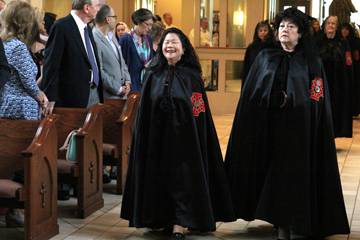
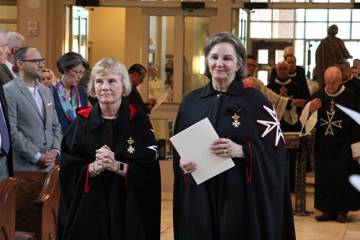
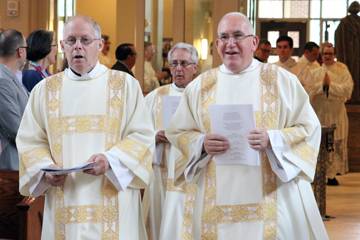
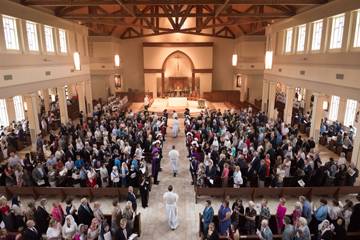
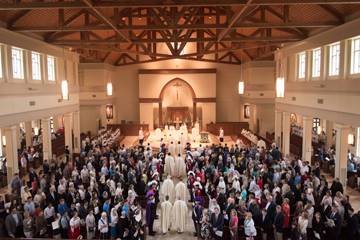
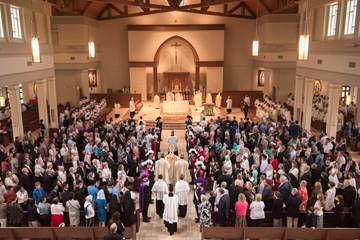
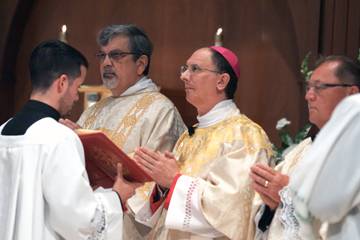
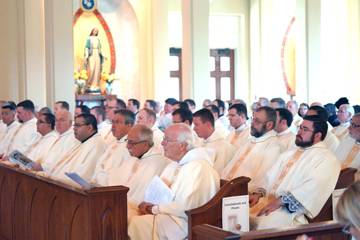
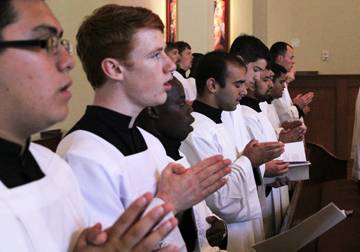
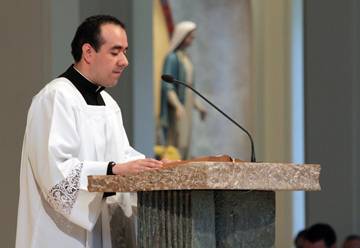
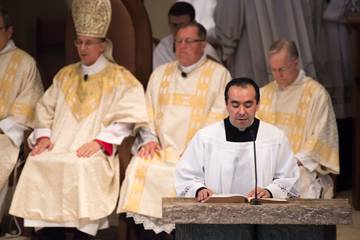
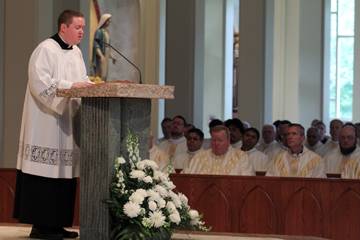
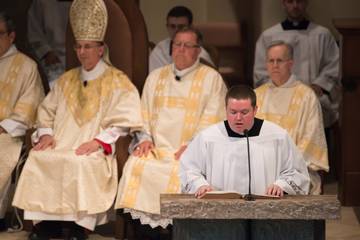
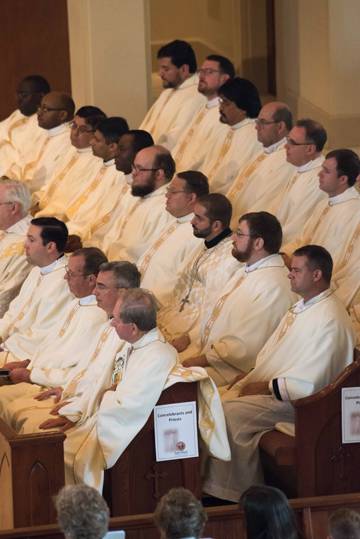
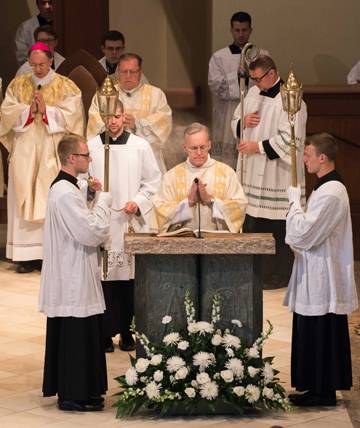
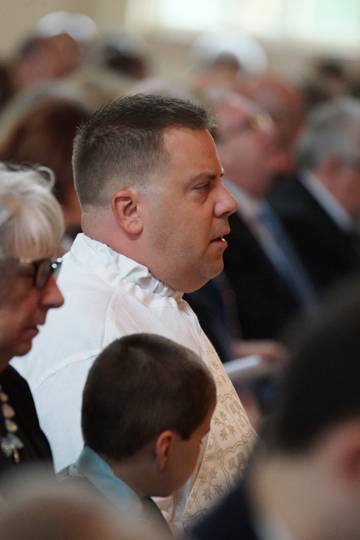
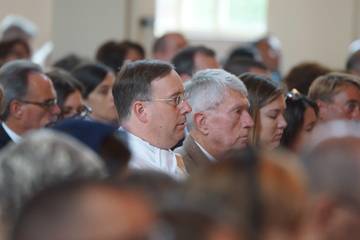
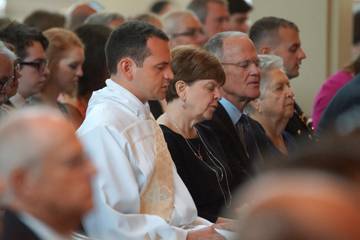
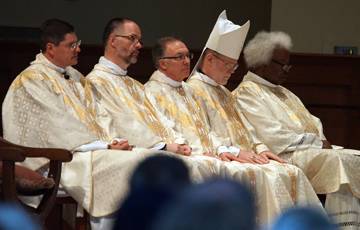
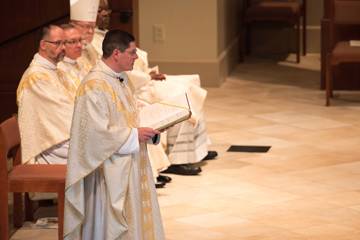
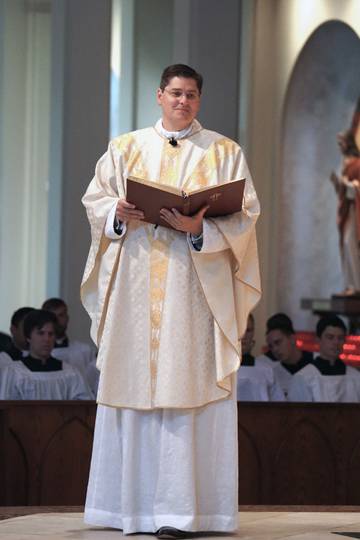
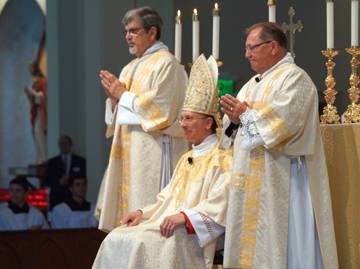
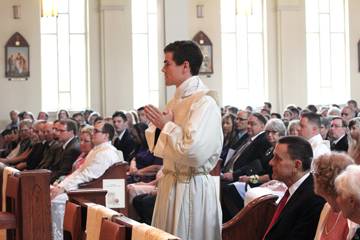
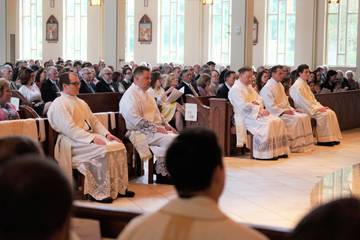
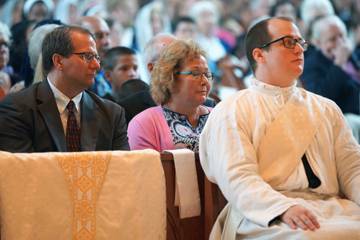
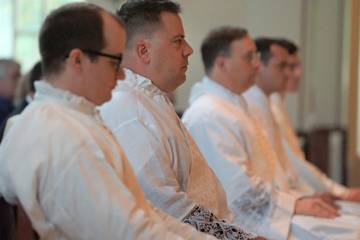
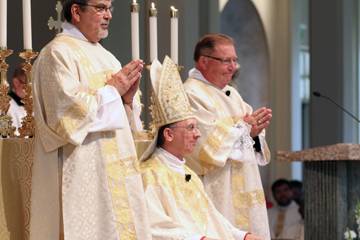
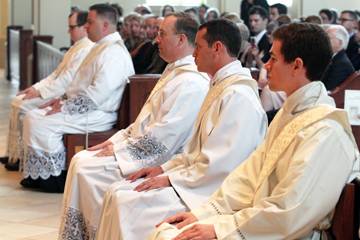
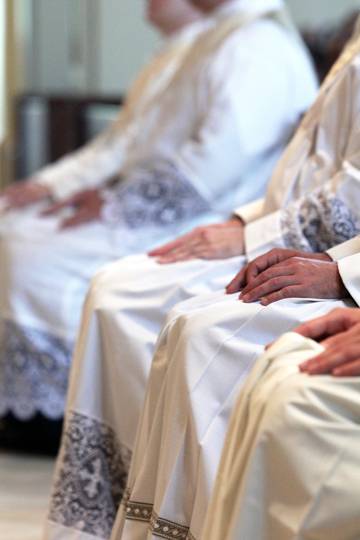
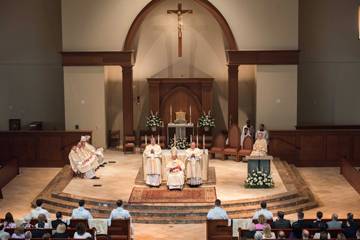
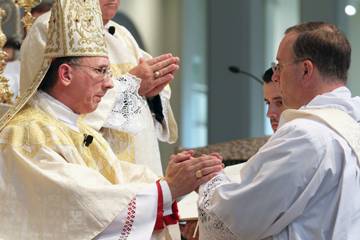
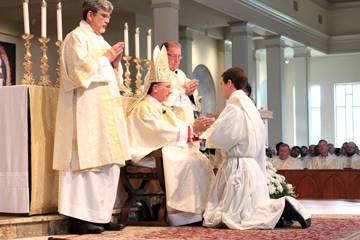
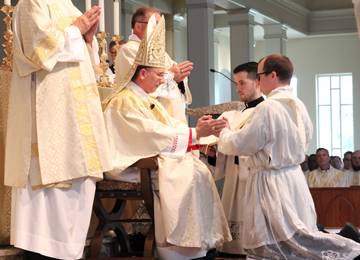
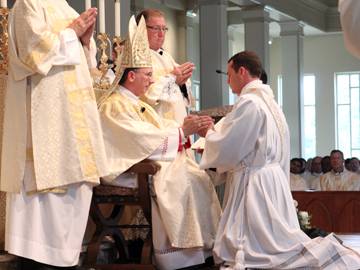
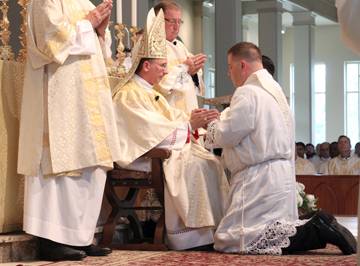
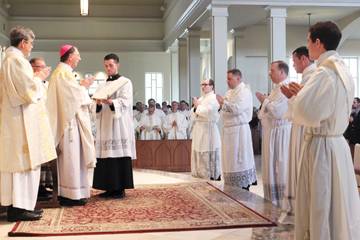
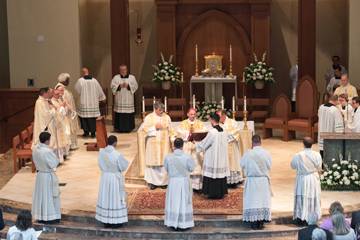
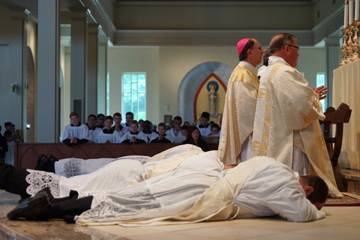
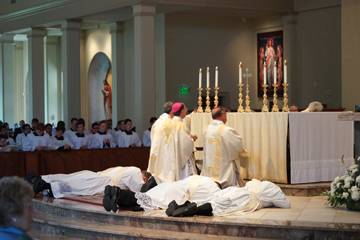
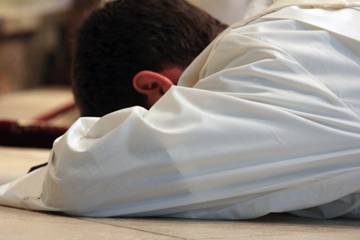
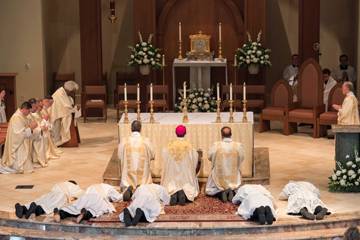
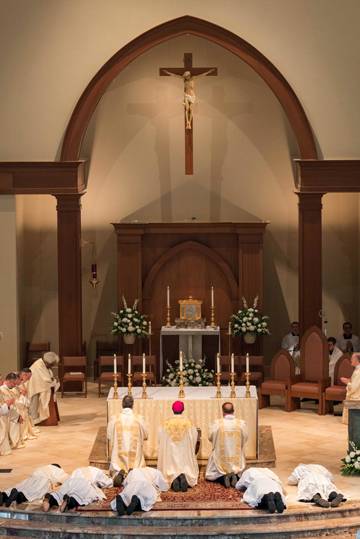
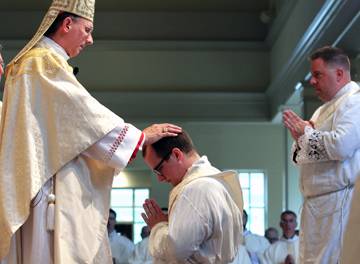
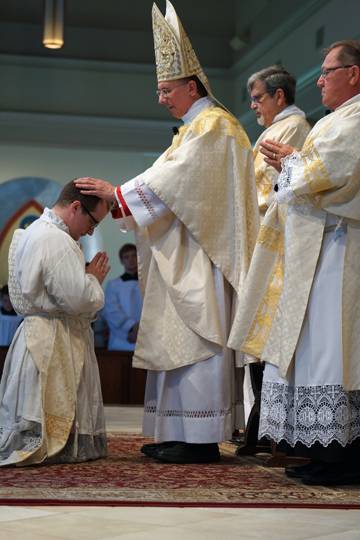
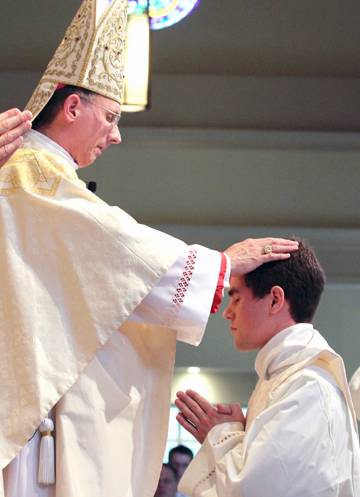
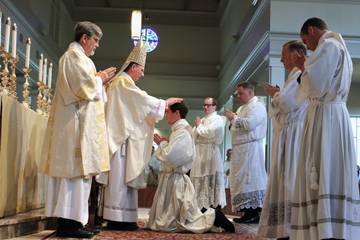
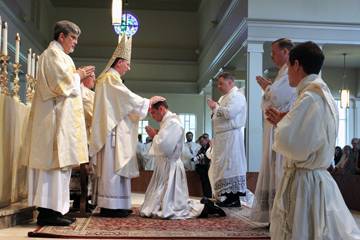
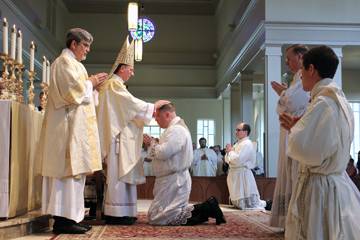
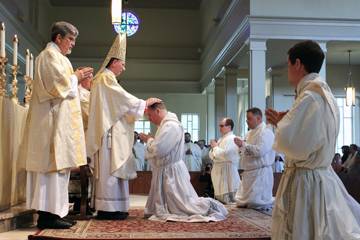
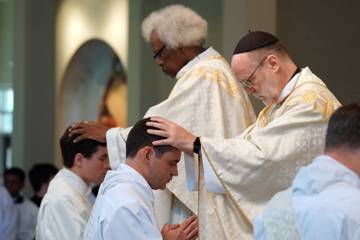
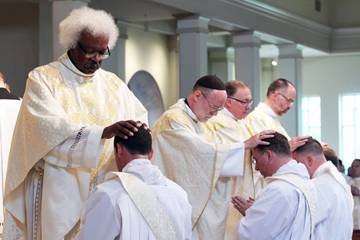
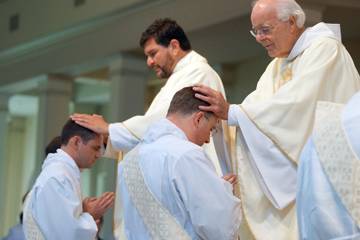
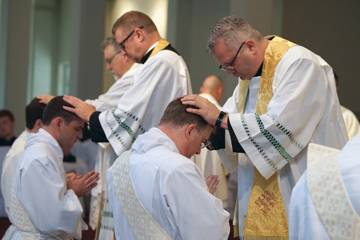
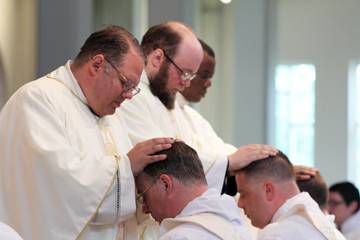
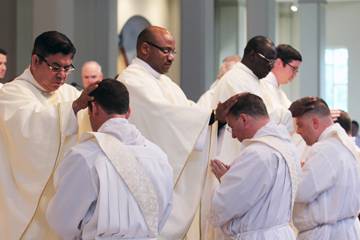
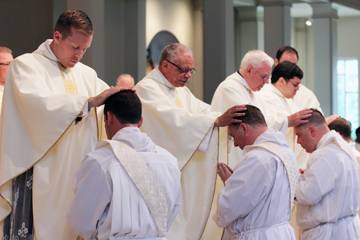
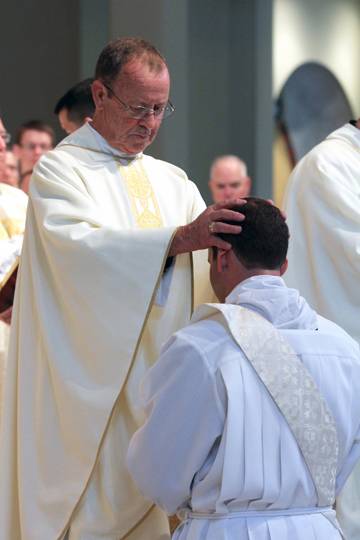
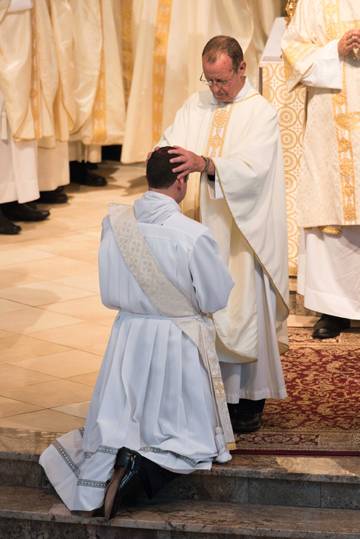
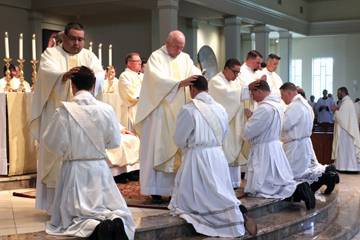
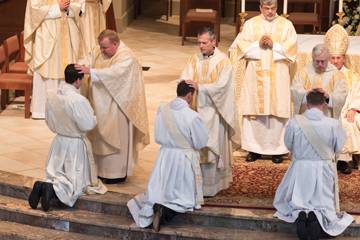
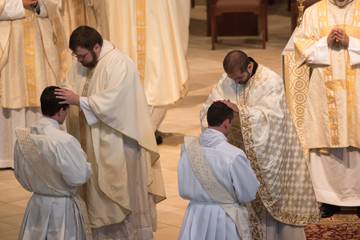
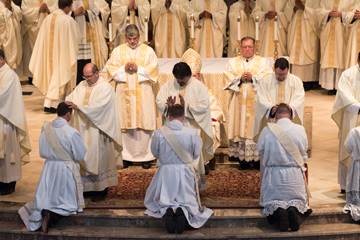
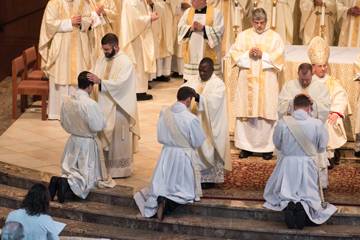
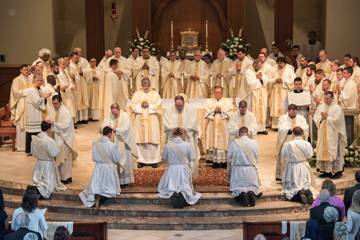
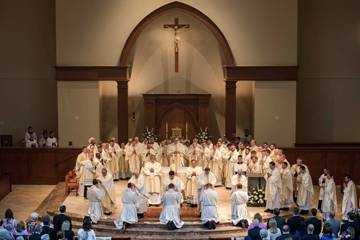
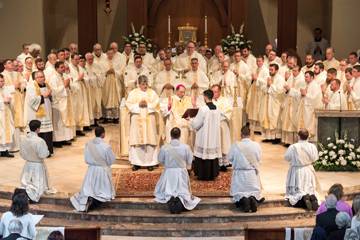
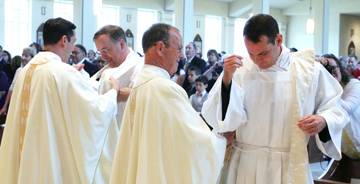
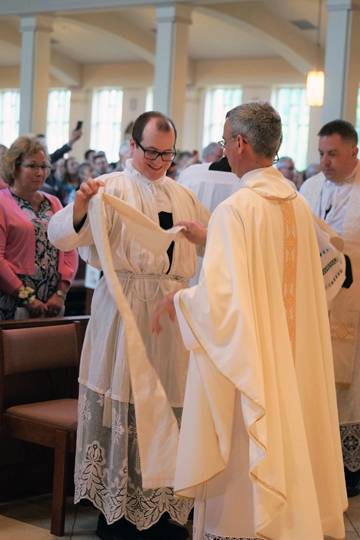
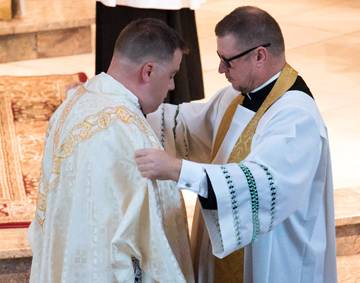
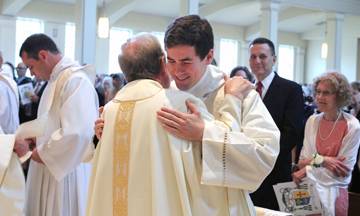
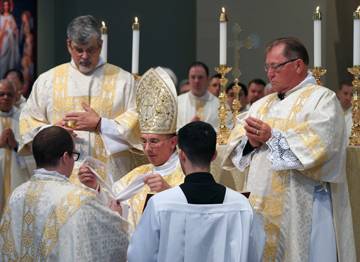
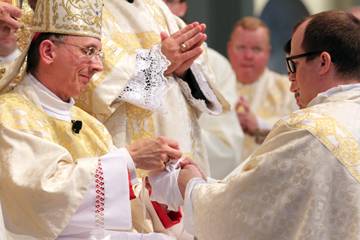
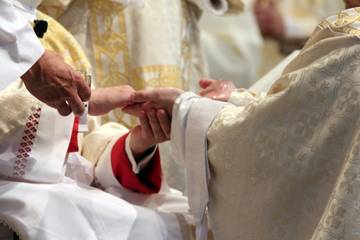
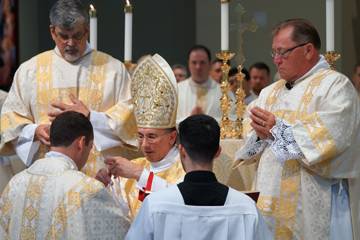
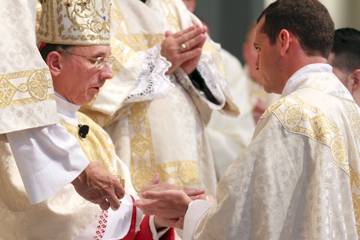
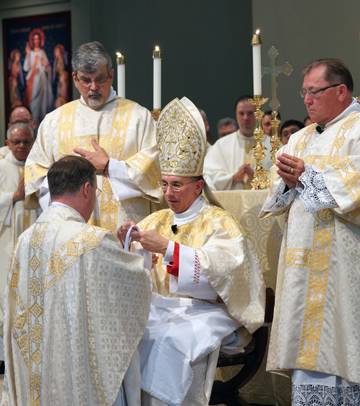
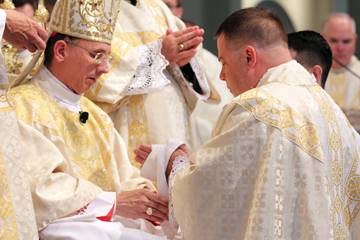
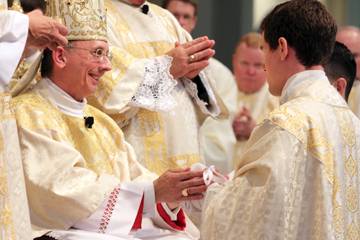
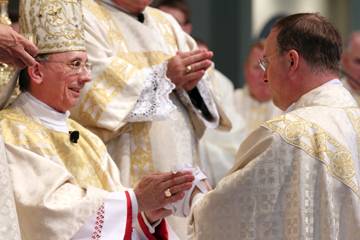
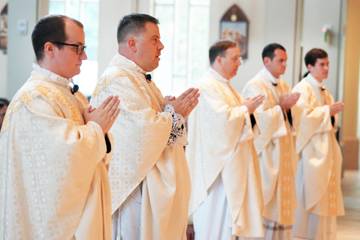
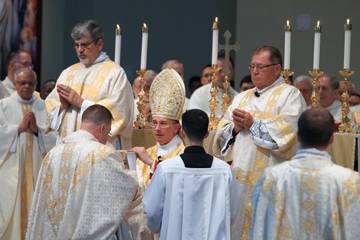
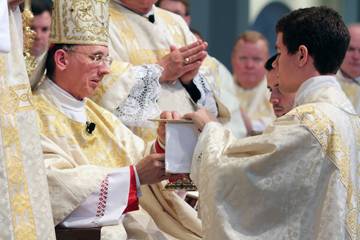
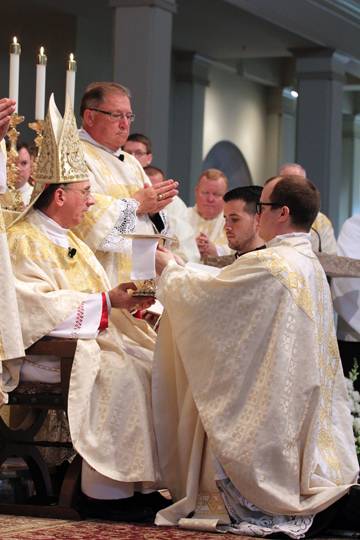
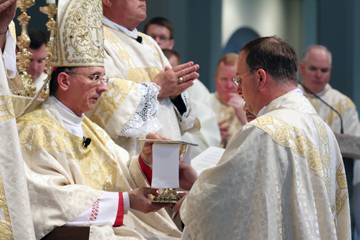
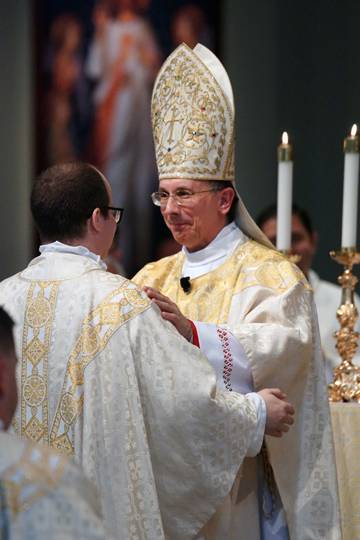
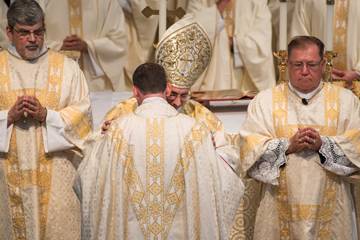
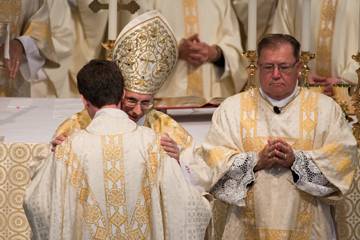
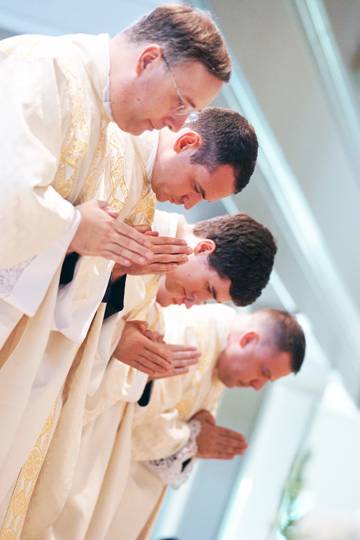
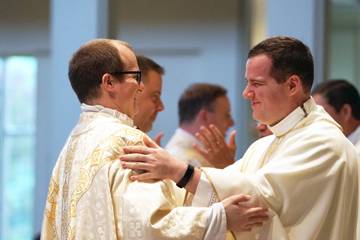
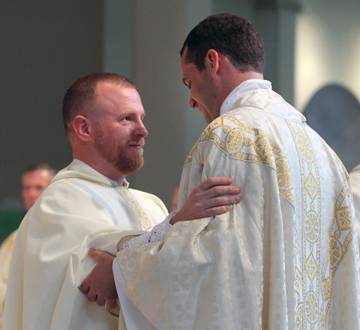
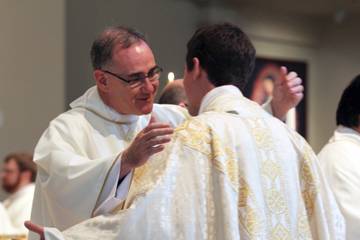
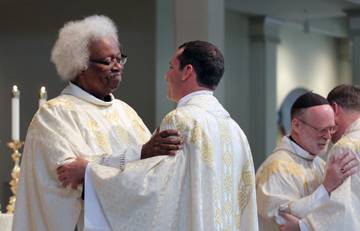
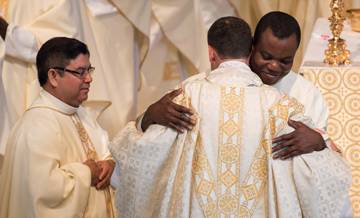
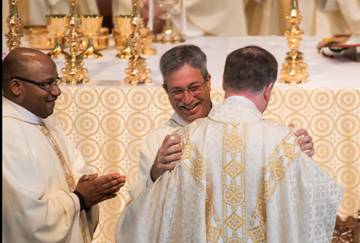
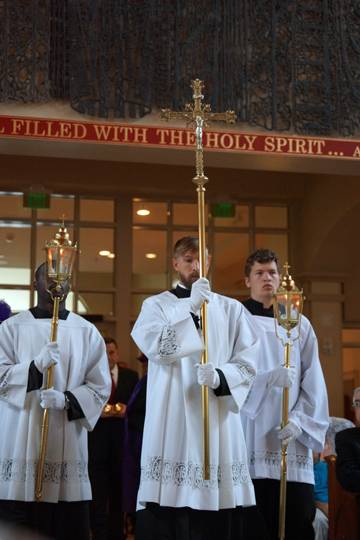
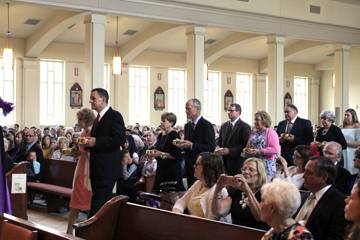
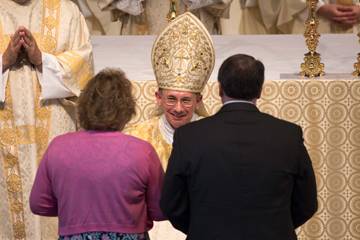
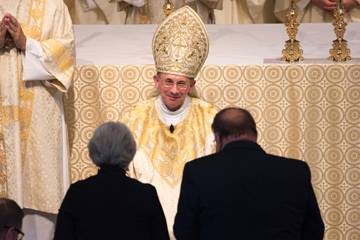
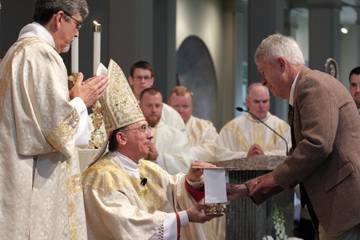
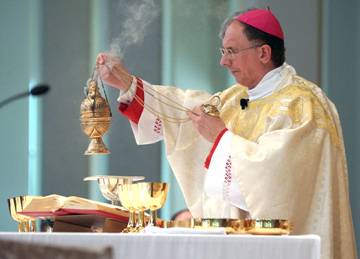
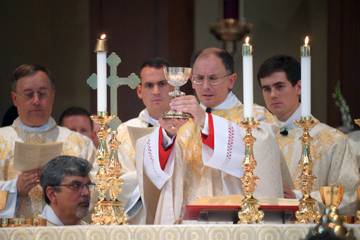
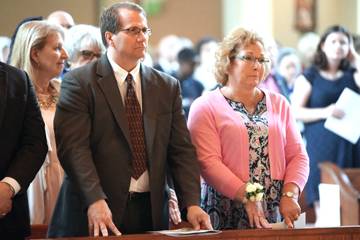
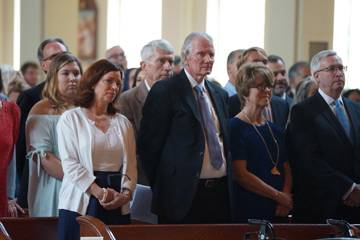
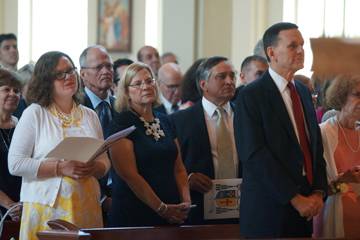
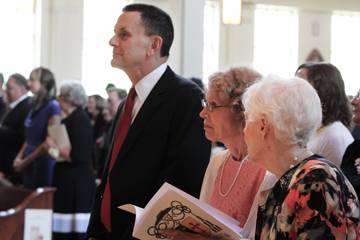
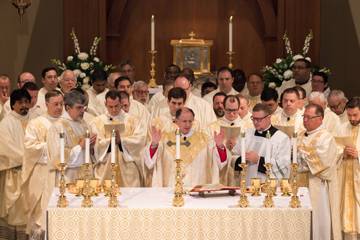
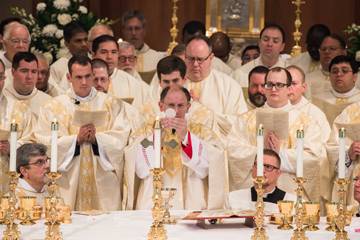
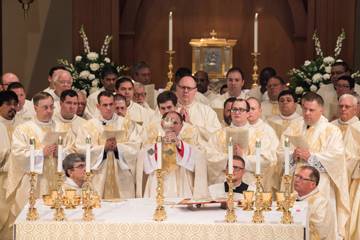
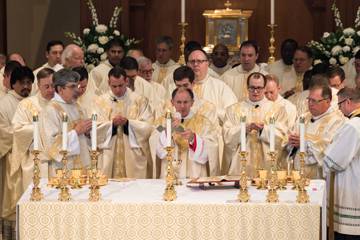
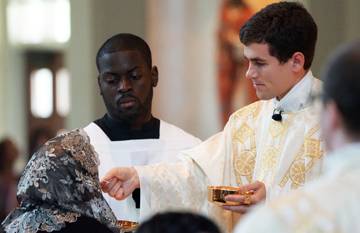
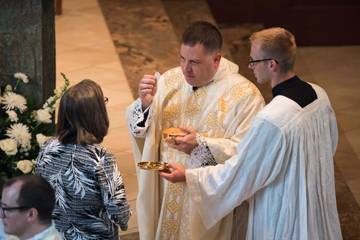
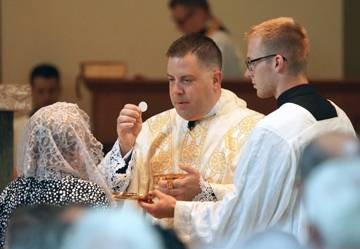
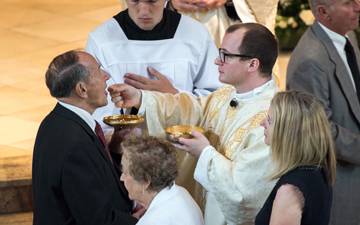
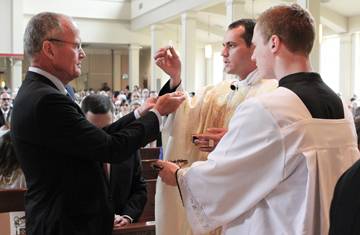
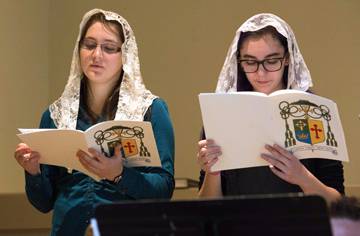
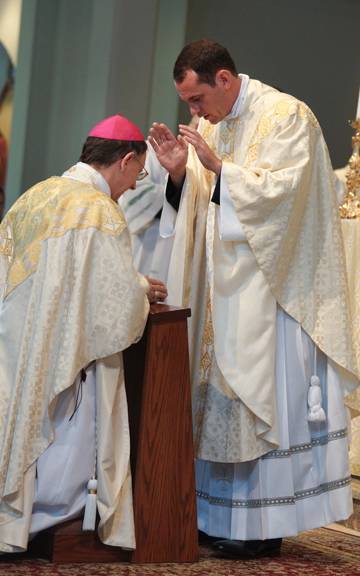
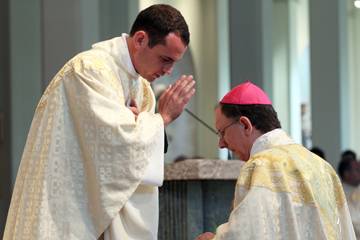
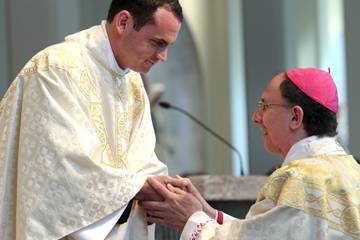
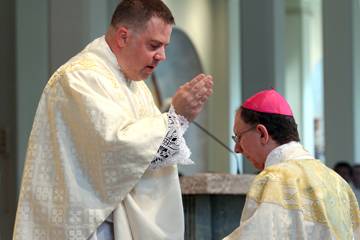
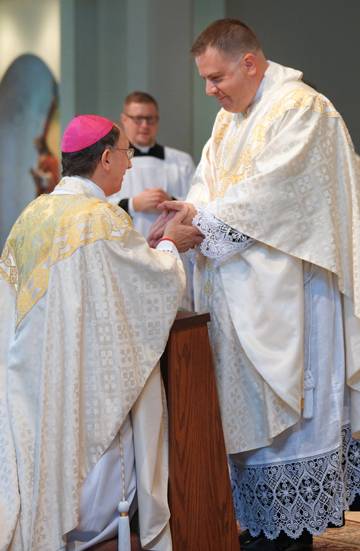
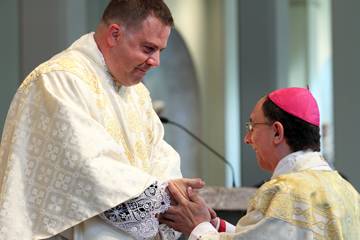
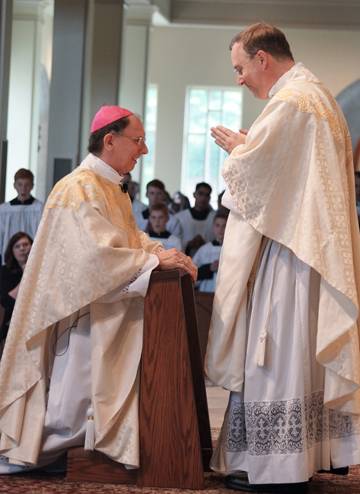
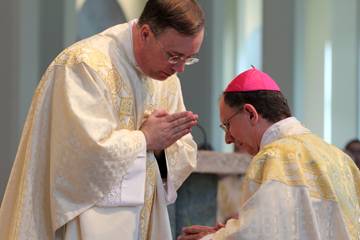
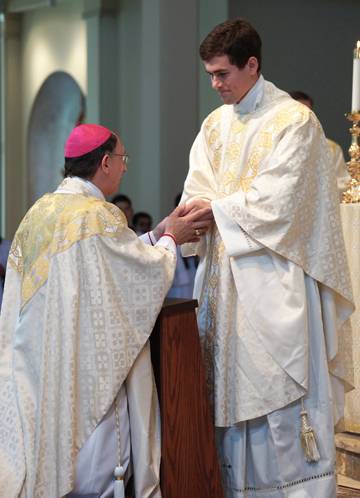
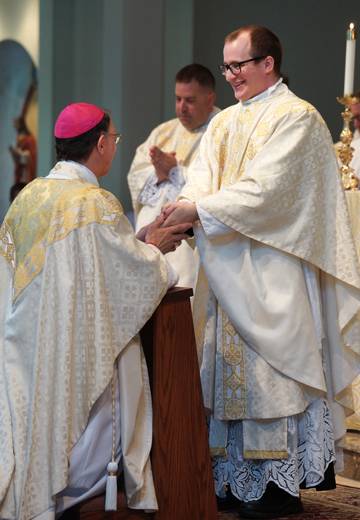
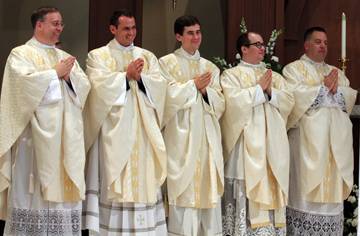
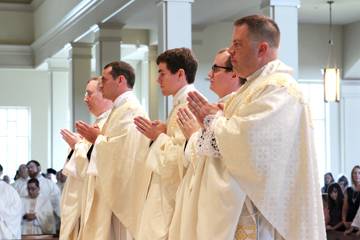
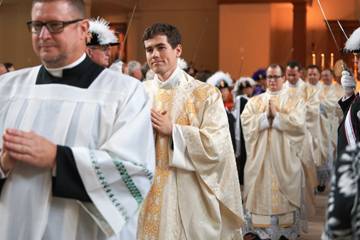
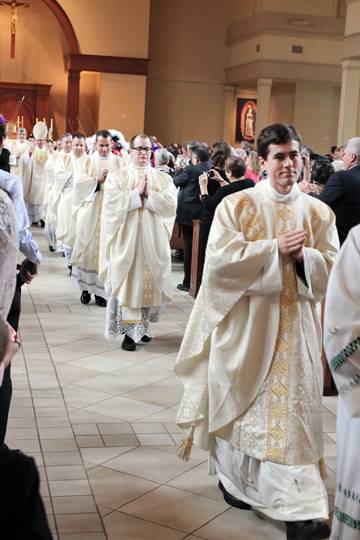
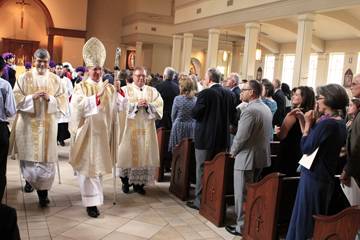
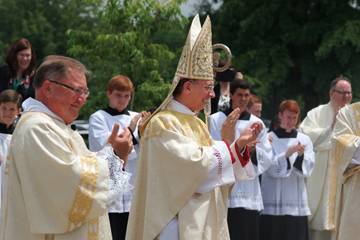

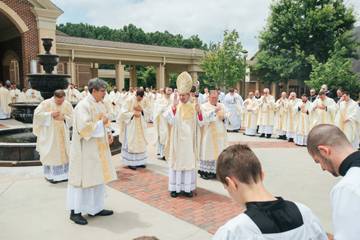
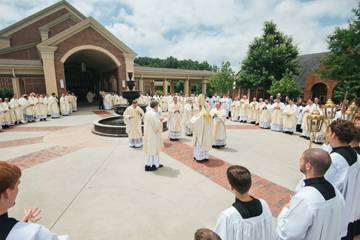
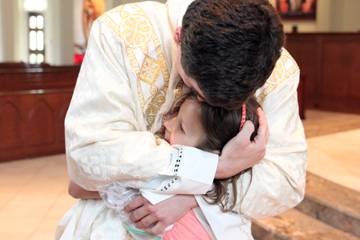
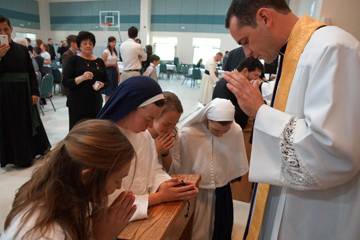
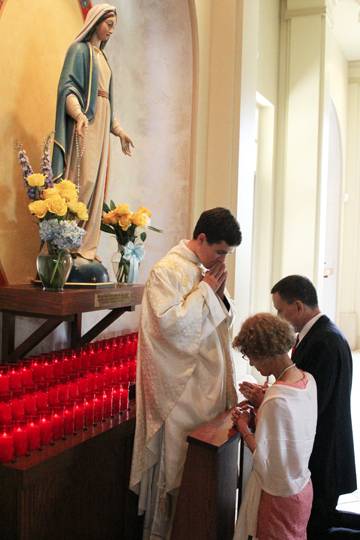
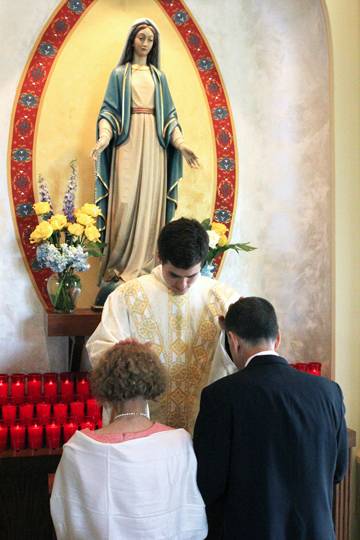
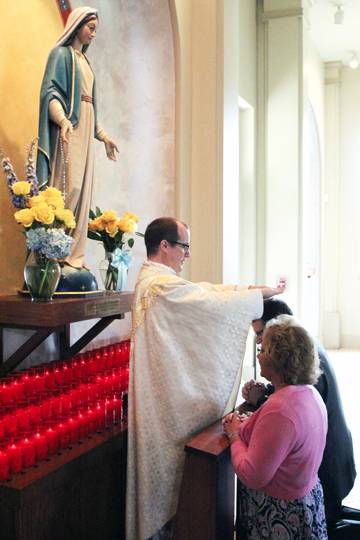
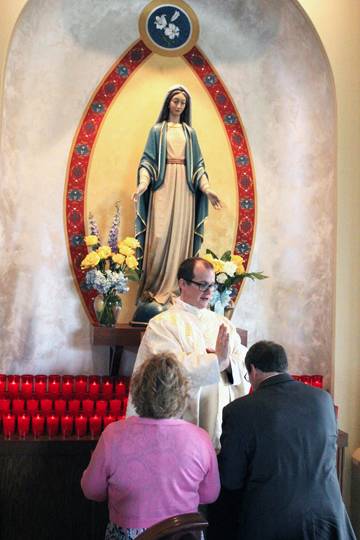
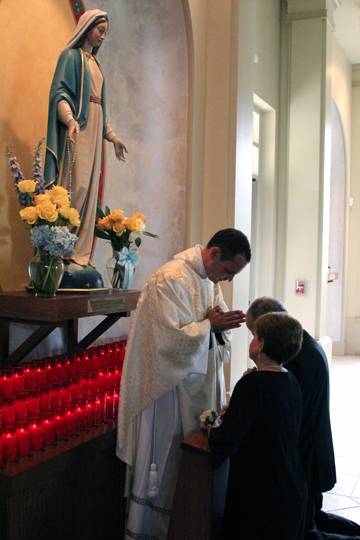
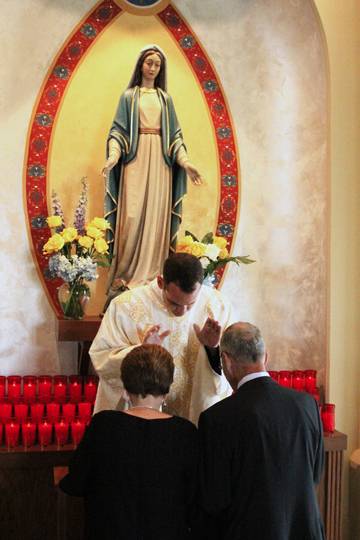
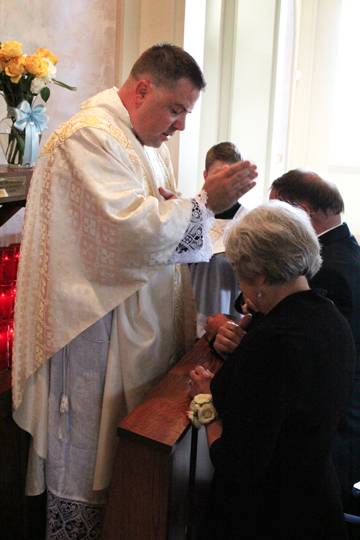
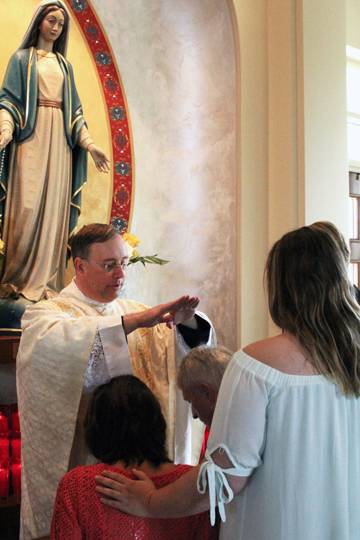
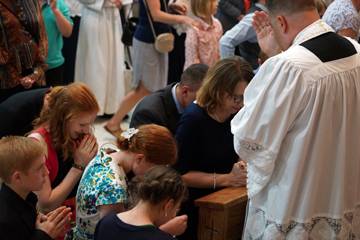
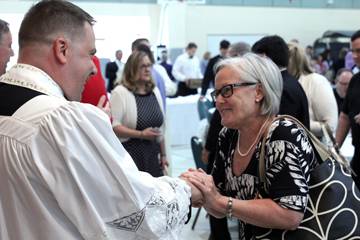
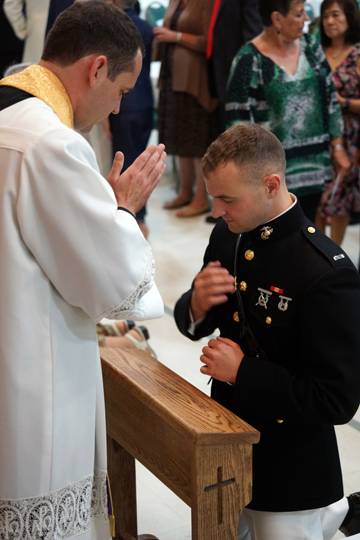
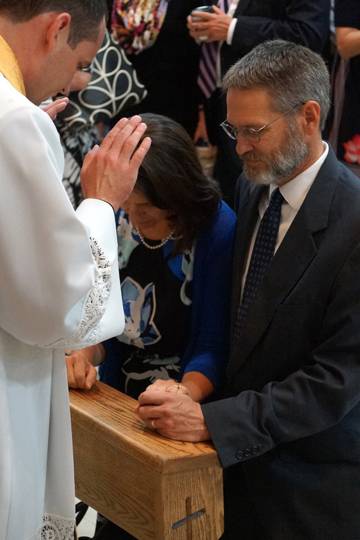
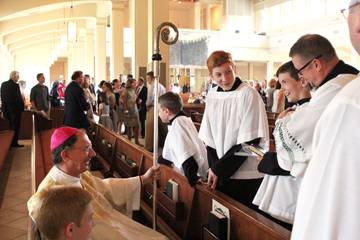
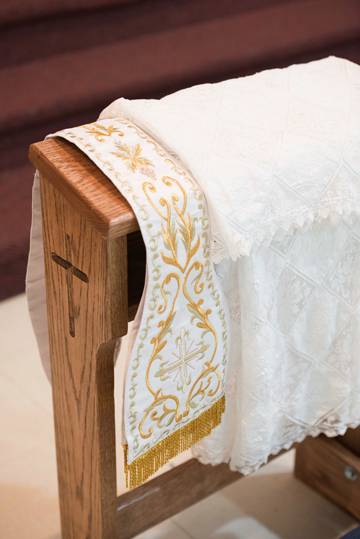
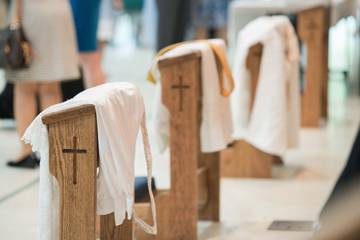
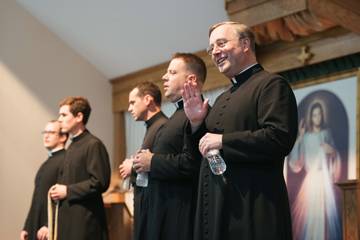
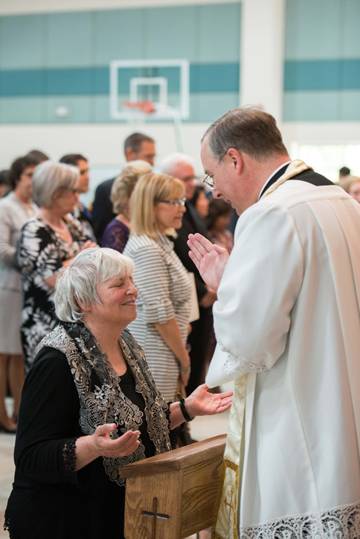
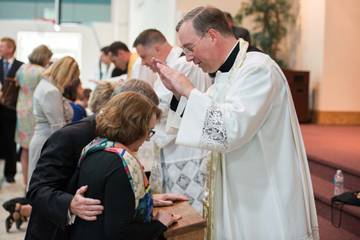
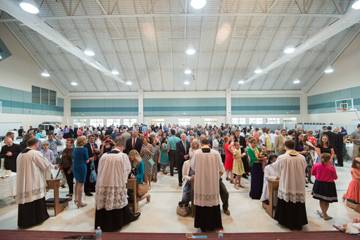
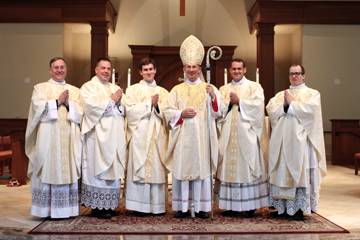













































































































































































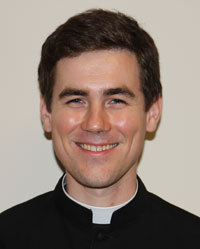
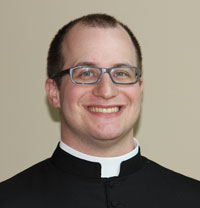 Home parish: St. Michael the Archangel Church, Gastonia
Home parish: St. Michael the Archangel Church, Gastonia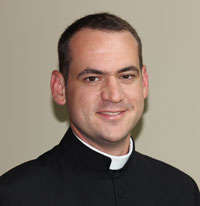 Home parish: St. Matthew Church, Charlotte
Home parish: St. Matthew Church, Charlotte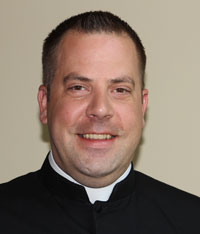 Home parish: St. Patrick Cathedral, Charlotte
Home parish: St. Patrick Cathedral, Charlotte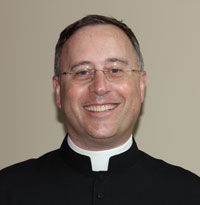 Home parish: St. Eugene Church, Asheville
Home parish: St. Eugene Church, Asheville